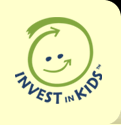Intellectual Development means being able to communicate, to think both creatively and abstractly, to pay attention, solve problems, and develop keen judgment and a lifelong readiness to learn. | Emerging Skills Follow a moving object with their eyes - initially to midline, with time, from side to side, up and down and in a circleShow a preference for gazing at facesExplore hands and objects by mouthingBat at and reach for toysRecognize familiar voices and brighten to their soundRecognize familiar surroundings and objectsShow early understanding of cause and effect relationship (for example, banging objects to make noise)Find out more about What to Expect from your baby, birth to six months. |
|
Parents Can: Use caregiving routines, such as diapering or changing, to talk to their baby about what is being done and what he is seeing, feeling and hearing | Child Will: Enjoy listening to your voice and looking at your faceBegin to recognize facial expressionsLearn to anticipate certain routines
| |
Parents Can: Call their baby's name when she is not looking | Child Will: Learn to locate soundsLearn to respond to her nameBegin to develop early stages of a self-concept
|
| | |
Parents Can: Hang mobiles and objects that make noise | Child Will: Watch the objects as they moveAccidentally hit the mobile, and discover the movement and sounds that are made in reactionBegin to reach on purpose to make the movement and sounds happen
| |
Parents Can: Provide objects of different textures for their baby to explore | Child Will: Experience different sensations of soft, rough, squishy, hard, bumpy and scratchyEventually learn to distinguish among different texturesPractice looking, reaching and touching objects (eye-hand coordination)
| |
Parents Can: Play social games, such as "peek-a-boo" or "Momma's coming to get you" | Child Will: Begin to develop his memory for people and objectsLearn to anticipate cause and effect, for example, tickling games and physical enjoyment
|
| | |
Parents Can: Sing short rhymes and play finger games | Child Will: Watch and listen to the words and actions he is experiencingLearn to recognize certain gestures/words and anticipate actions that follow
| |
Parents Can: Play with their baby in front of mirrors | Child Will: Learn to recognize her reflection in the mirrorBegin to understand that she is a separate being from her caregivers
| |
Parents Can: Create safe play spaces with pillows and favourite toys | Child Will: Learn what objects do by manipulating, banging and throwing themWant to explore the environment if a caregiver is near, supportive and responsive to cues
|
| |
|
